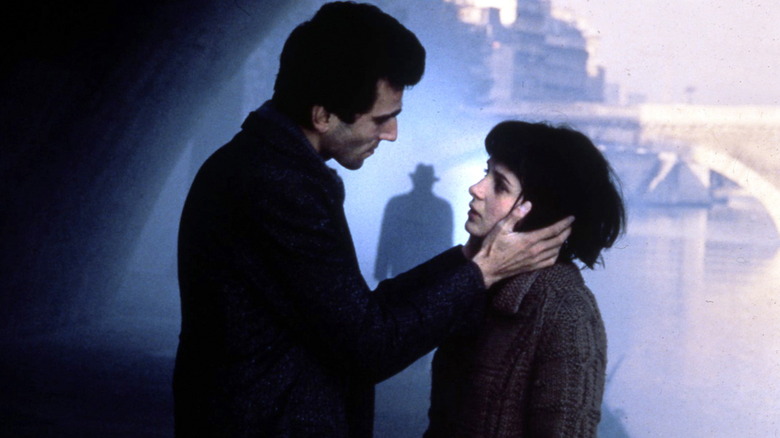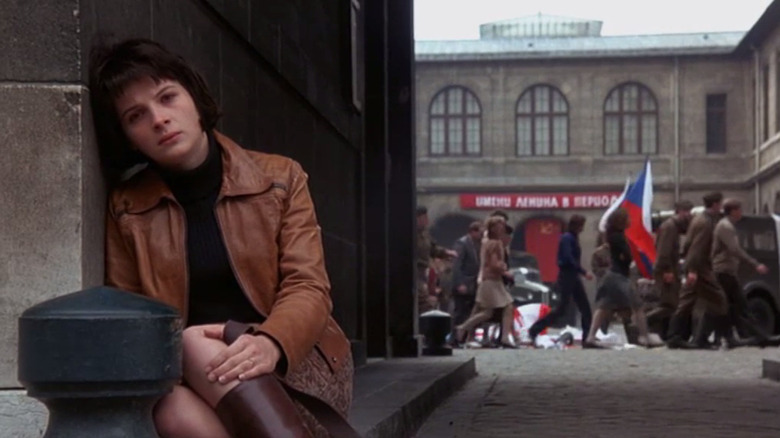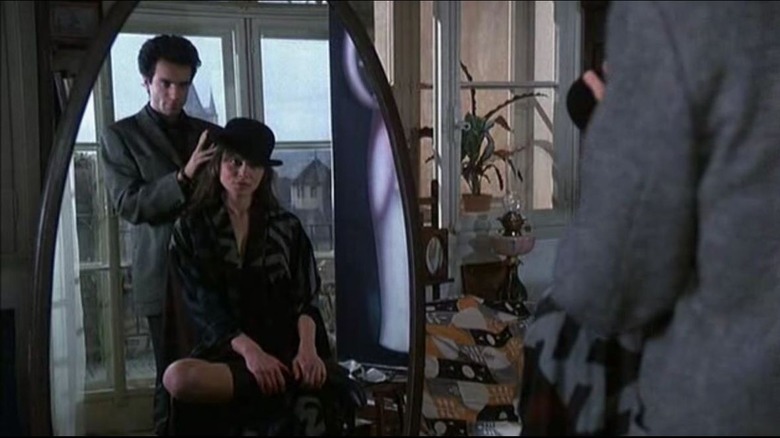Daniel Day-Lewis Admitted His Method Acting Missed The Mark In The Unbearable Lightness Of Being
Everyone knows Daniel Day-Lewis is one of the most meticulous Method actors in cinema, and there are plenty of wild stories about how far he is willing to go in preparation for a role. There's the one about how he insisted on staying in character during the shoot of "My Left Foot," refusing to leave his character's wheelchair and insisting on crew members feeding him during meals. Then there was the time he lived in the wilderness, hunting his own food, to get ready for "The Last of the Mohicans," or trained for three years to become a convincing pugilist in "The Boxer."
It's all part of the Daniel Day-Lewis legend and, whether you think it's over the top or not, his dedication to getting himself in the right space physically and mentally for a role has translated into a shedload of awards and a reputation as one of our greatest living actors. Some of Day-Lewis' Method prep must have been grueling, but arguably his toughest (and potentially unnecessary) feat was learning Czech ahead of his role in "The Unbearable Lightness of Being."
In Philip Kaufman's adaptation of Milan Kundera's famous novel, Day-Lewis played Tomas, a womanizing Prague brain surgeon juggling affairs with two women — worldly artist Sabine (Lena Olin) and naive waitress Tereza (Juliette Binoche) — during a time of great political upheaval in '60s Communist Czechoslovakia. As an American production, the screenplay is almost entirely in English, so why did the actor feel the need to take on such a difficult language?
The unimaginable difficulty of learning Czech
I've lived in the Czech Republic for 13 years now and learning the language has been an absolute nightmare. I took lessons for a few years but very little stuck, and even now I am only able to fumble through the most basic interactions. I know a few expats who speak Czech pretty fluently, but they tend to be people who have either been here forever, and/or live with a Czech partner. My other half is also English, and we're rapidly approaching the point when our children's fluency in Czech is outstripping ours.
The Foreign Service Institute (FSI) ranked languages by difficulty for native English speakers and Czech falls into the fourth category out of five, five being the hardest. It's in the same pot as Polish, Bengali, Hebrew, Khmer, and Zulu, and is generally regarded as a brutal language to learn.
"The Unbearable Lightness of Being" came early in Day-Lewis' career and he later admitted to The Guardian that taking the role was a bad decision, with the language becoming a factor:
I was swayed by the hullabaloo surrounding "The Unbearable Lightness of Being," which I was encouraged to believe every young actor was after. If I'd really shut out the din and looked at that script, I'd have known that I wasn't ready for that. I felt I was short-changing them somehow because I was missing the centre of it. It was sliding away from me... It was something to do with the language. The idea of speaking English with a Czech accent without actually speaking Czech meant it wasn't coming from anywhere – I knew that kernel of truth that I need to have somewhere in a role would be missing.
So Day-Lewis naturally felt the solution was to learn the lingo.
Was learning Czech for Unbearable Lightness worth it?
"The Unbearable Lightness of Being" is a long film that doesn't really delve into the philosophical elements of Kundera's novel too much, leaving you with a three-hour erotic historical drama that gets repetitive as our protagonist goes between Sabine and Tereza, with several side-conquests along the way. For all its steamy moments, the film's best sequence is a terrific recreation of the Prague Spring uprising in 1968, when Soviet-led troops marched into Czechoslovakia to squash a brief period of liberalization. Real footage from the crisis is seamlessly interwoven with recreations, putting the actors right there in the moment.
Philip Kaufman, better known for "Invasion of the Body Snatchers" and "The Right Stuff," does a solid job of Americanizing the European arthouse style, although this occasionally gives the film a mid-Atlantic feel. As for Day-Lewis's accent ... I wasn't convinced at all. At times he sounds more like Vlad the Impaler than any Czech I know when they're speaking English. It's a very studied performance in general, maybe the least convincing of his career. He usually disappears into a character, but all I saw was Daniel Day-Lewis prowling around doing an iffy foreign accent.
"Unbearable Lightness" was well-received by critics but flopped at the box office, perhaps unsurprising for a three-hour movie based on a philosophical novel with a title like "The Unbearable Lightness of Being." To add insult to injury, Kundera, who acted as consultant on film, was unhappy with the end result and subsequently banned any further adaptations of his work. So all in all, learning Czech for an English-speaking part was just an unbelievable waste of time.


